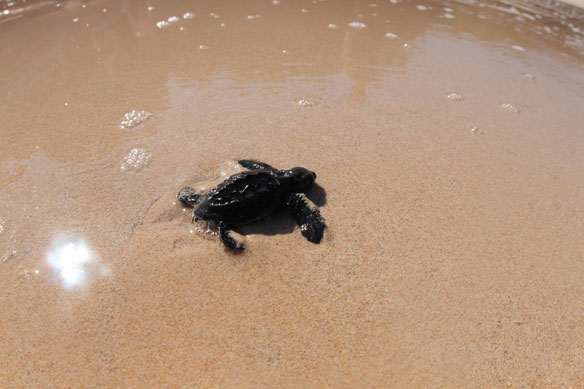
“When plastic ingestion occurs, it blocks the digestive tract, gets lodged in animals windpipes cutting airflow causing suffocation, or fills the stomach, resulting in malnutrition, starvation and potentially death. Indeed, it is found that debris often accumulates in the animals’ gut and give a false sense of fullness, causing the animal to stop eating and slowly starve to death.” —Captions and Photo: © SAF — Coastal Care
Excerpts;
The oceanic island of Príncipe lies in the Gulf of Guinea off the west coast of Africa. In 2012, the entire island was designated as a UNESCO Biosphere Reserve
The waters surrounding Príncipe harbour five of the world’s seven species of sea turtle and this remote island’s relatively pristine beaches provide crucial nesting sites.
Arguably, the most insidious threat is the plastic permeating Príncipe’s waters and piling up on its beaches…
Read Full Article; PhysOrg (02-17-2020)
Microplastics found deep in sand where turtles nest; Phys Org (09-26-2018)
Scientists found an average of 5,300 particles of plastic per cubic metre at depths of 60cm (2ft) on beaches in Cyprus used by green turtles and loggerheads. These beaches in Cyprus are located far from industrial practices and aren’t visited by large numbers of people. The findings support the theory that beaches act as a “sink” for marine micro plastics…
Micronizing ocean plastics threaten sea turtle populations, ocean life cycle; Science Daily (09-17-2018)
Ingestion of degrading ocean plastics likely poses a substantial risk to the survival of post-hatchling sea turtles because the particles can lead to blockages and nutritional deficiencies, according to new research…
The Plastic Found In a Single Turtle’s Stomach, Daily Mail (03-24-2011)
Marine turtles dying after becoming entangled in plastic rubbish; Science Daily (12-18-2017)
Plastic Pollution / When The Mermaids Cry: The Great Plastic Tide, Coastal Care
“The unprecedented plastic waste tide plaguing our oceans and shores, can become as limited as our chosen relationship with plastics, which involves a dramatic behavioral change on our part…”








